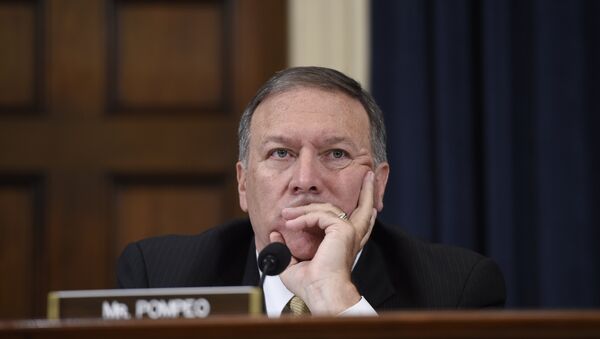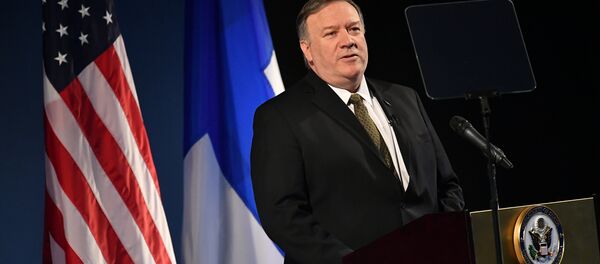Speaking exclusively to The Telegraph from Lancaster House, Mike Pompeo said he had opted to cancel a planned visit to meet with German Chancellor Angela Merkel and instead head to the Iraqi capital Baghdad upon receiving intelligence that suggested Iranian forces and proxies were planning to target American forces in Syria, Iraq and at sea “that suggested it was a good time for me to go visit Iraq”.
The US Secretary of State used his London visit on Wednesday to enlist the support of Britain and Europe in Washington's intensifying confrontation with Iran regarding its nuclear programme.
READ MORE: US-EU Tension: What's Behind the Cancellation of Pompeo-Merkel Meeting?
Pompeo’s 20-minute speech at the Centre for Policy Studies think-tank focused on the virtues of the indelible links between Britain and the US.
The Secretary of State didn’t stop short of voicing his personal esteem for former British Prime Minister Margaret Thatcher, as he warned the UK against granting Chinese technology company Huawei access to Britain’s 5G networks, arguing that it poses a risk to British citizens and could breach privacy protections.
However, it was Washington’s mounting confrontation with Iran that was in the spotlight.
On Wednesday, Iranian President Hassan Rouhani turned the heat on European signatories, including the UK, threatening to resume nuclear enrichment within 60 days if they failed to fulfil their oil and financial commitments under the JCPOA deal.
READ MORE: B-52 Bombers Join US Forces Sent to The Middle East Over Iran ‘Threat' — Report
The US has been imposing increasingly severe sanctions on Tehran, as the Trump administration announced further measures targeting its steel, aluminium, copper and iron sectors on Wednesday, and stated it was sending a carrier strike group and bombers to the Middle East to counter “troubling and escalatory indications” of Iranian activity in the region.
US intelligence officials believe Iran might attack American interests in neighbouring countries such as Iraq.
Over the weekend, “there were a handful of information streams that we saw that generated concern,” said Pompeo.
Rather than persisting in maintaining business contacts with Tehran, stated Pompeo, Britain and other European allies should be siding with Washington’s sanctions policy against Iran, and thus resisting Iranian pressure.
“We think the ideal course is that every nation join the sanctions regime that exists today,” he said.
“We believe that denying Iran the wealth to foment terror, denying Iran the wealth to continue its ballistic missile testing and its nuclear programme is a good thing."
Mike Pompeo, however, insisted there was hardly any “daylight” between the British and American positions on Iran, as the two countries displayed different approaches to the nuclear deal.
“When it comes to the threat from Iran they understand that the Islamic Republic of Iran is underwriting Hizbollah,” Pompeo said, referring to the British government.
“They share our assessment of the threat, but they have taken a different approach when it comes to constraining Iran’s nuclear ambitions."
During his lecture, Pompeo laid particular emphasis on the importance of maintaining the special relationship, which he described as being the “sturdy pillars of our relationship.”
In his interview with The Telegraph, the US Secretary of State insisted that the outcome of Brexit would in no way impair this vital relationship between Washington and the UK.
“We have told Britain’s political leadership that this is their sovereign choice, their path to choose,” he said.
“This is an important economic relationship. We stand ready to engage with free trade agreements when the moment comes, which we know will be good for our two countries,” concluded the US State Secretary.
Why London's Position is Important for US
Commenting on the matter, a lecturer in Middle Eastern Politics Dr Alam Saleh from the Lancaster University in the United Kingdom, stated that he believes that Europe would eventually back the US' stance on Iran. According to him, London's position is particularly important in the post-Brexit era, when the UK "needs the United States most and would not follow Iran’s interests nor EU’s policies."
He believes that Washington is not interested in any other actors with regard to Iran in order "not to interrupt their the so-called maximum pressure policy against Iran."
Britain's position, however, is crucial, the scholar believes, as it may be able to help the United States to influence EU policies in this regard. "Yet it may not last long, since UK is leaving Europe sooner or later."
At the same time, Dr. Peter Kuznick, the director of the Nuclear Studies Institute at the American University in Washington, reminded of the Blair'era Iraq invasion and warned the UK against repeating the scenario.
"They must not once again be party to immoral and dangerous actions by supporting the unconscionable US.actions toward Iran. The JCPOA was precisely the kind of international diplomacy that the world needed. Besides that, it was working. But the hawks in the Trump administration are itching for an excuse to attack Iran," he emphasised.




